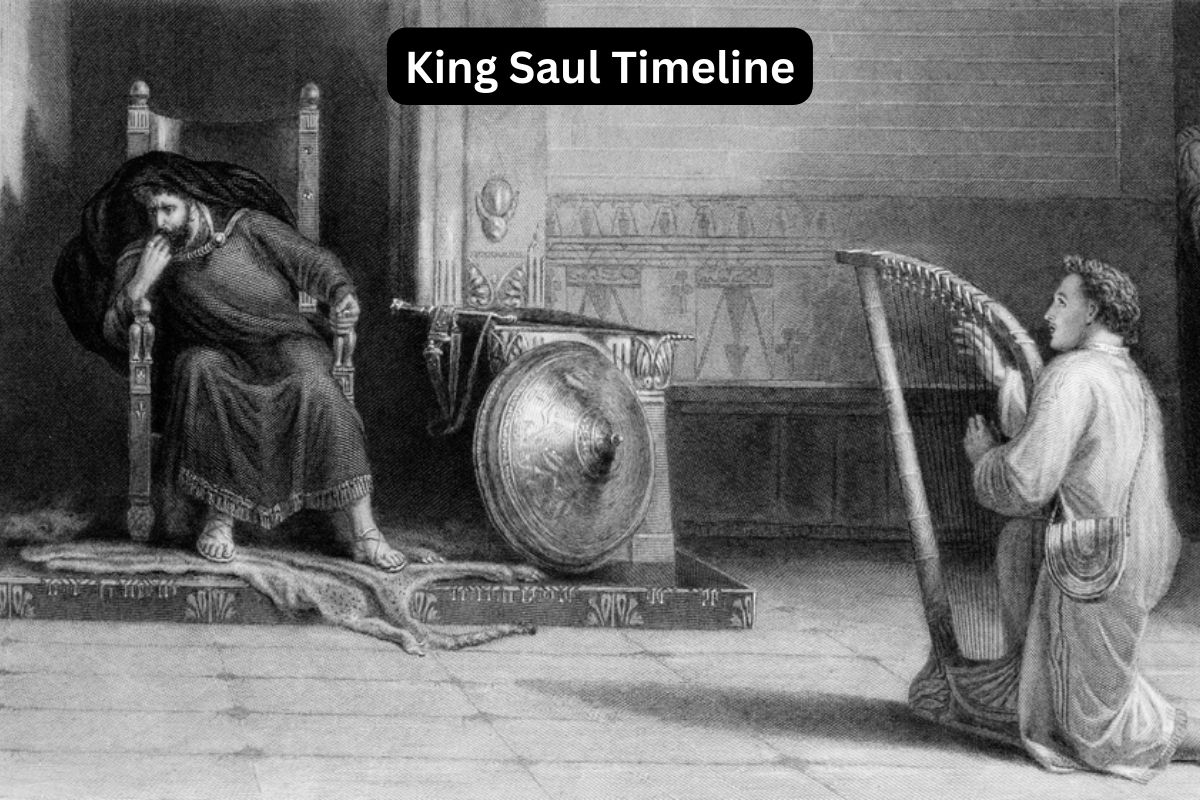In the annals of ancient Israel, King Saul occupies a pivotal role as the first monarch to rule over the newly formed kingdom. His rise to power, early successes, and subsequent descent into madness and rejection by God are essential chapters in the biblical narrative.
King Saul’s reign paved the way for the legendary King David, and his story serves as a foundational element of Israel’s history and the Old Testament.
In this article, we will delve into the key events and the dramatic arc of King Saul’s life and reign, shedding light on his relationship with the future King David and his ultimate fate on the battlefield of Mount Gilboa.
| Event | Approximate Year | Description |
|---|---|---|
| Saul anointed as king | Approximately 1020 BC | Saul is anointed as the first king of Israel by the prophet Samuel. |
| Early reign and military successes | Various | Saul leads the Israelites in battles against enemies, including the Ammonites and Philistines. |
| Disobedience and rejection by God | Various | Saul disobeys God’s instructions, leading to God’s rejection of him as king. |
| David anointed as future king | Approximately 1010 BC | Samuel anoints David as the future king of Israel, signaling God’s choice of a new king. |
| David and Saul’s relationship | Various | Saul becomes jealous of David, leading to conflicts and attempts on David’s life. |
| Saul’s descent into madness | Various | Saul’s mental state deteriorates, possibly due to stress and conflicts. |
| Death of Saul and his sons | Approximately 1000 BC | Saul and his sons are killed in a battle against the Philistines on Mount Gilboa. |
Timeline of King Saul
1. Saul anointed as king (Approximately 1020 BC):
Saul’s anointing as king marked a significant turning point in the history of Israel. Prior to this event, Israel was a loose confederation of tribes, and there was no centralized monarchy.
Also Read: Facts About King Saul
The people of Israel had requested a king to rule over them like the surrounding nations. God directed the prophet Samuel to anoint Saul, a tall and handsome Benjamite, as the first king of Israel.Initially, Saul enjoyed popularity and military success as king.
He led the Israelites in battles against their enemies, including the Ammonites and Philistines. His anointing symbolized the people’s desire for a strong, centralized leadership.

2. Early reign and military successes (Various):
During the early years of Saul’s reign, he proved to be a capable military leader. He successfully defended Israel against various threats and expanded its territory.
Some of his notable achievements included defeating the Ammonites (1 Samuel 11) and securing victories over the Philistines (1 Samuel 13).
3. Disobedience and rejection by God (Various):
Despite his initial success, Saul’s reign took a dark turn due to his disobedience to God’s commands. One significant event occurred when the Philistines assembled a large army against Israel, and Saul grew impatient waiting for the prophet Samuel to offer sacrifices before battle.
Also Read: King David Facts
In his impatience, Saul offered the sacrifices himself, which was a violation of God’s instructions (1 Samuel 13). As a result, Samuel prophesied that God had rejected Saul’s kingship, and his dynasty would not endure.
Another pivotal moment was Saul’s failure to completely destroy the Amalekites as commanded by God (1 Samuel 15). He spared their king, Agag, and some of the best livestock, which led to God’s declaration that He regretted making Saul king.

4. David anointed as future king (Approximately 1010 BC):
Around 1010 BC, the prophet Samuel anointed David, a young shepherd and the son of Jesse, as the future king of Israel.
This anointing was done in secret and marked God’s choice of David as Saul’s successor. It is important to note that at this point, David was not yet king, but he had been chosen and anointed by God for that future role.
This event took place in Bethlehem and was significant because it indicated a shift in divine favor away from Saul and toward David.
5. David and Saul’s relationship (Various):
As David gained prominence in Saul’s court due to his musical talents and bravery in battle, Saul’s jealousy grew. Saul’s insecurity and fear that David might usurp his throne led to a strained relationship between them.
Saul attempted to kill David on multiple occasions, including throwing a spear at him while David was playing the harp (1 Samuel 18) and sending him on dangerous military missions hoping he would be killed (1 Samuel 18-19).
Despite the constant threat to his life, David remained loyal to Saul as the anointed king and even spared Saul’s life on more than one occasion when he had the opportunity to kill him. This demonstrated David’s character and his understanding of the sacredness of God’s anointing.

6. Saul’s descent into madness (Various):
As Saul’s jealousy and paranoia grew, his mental state deteriorated. There are accounts of him experiencing episodes of madness and erratic behavior.
For example, he consulted with a medium to speak with the spirit of the deceased prophet Samuel (1 Samuel 28), an action that was strictly forbidden by Mosaic law. This act demonstrated the depths of his desperation and mental turmoil.
Saul’s mental instability made him increasingly unfit to rule, and his kingdom faced internal challenges as a result. It was during this period of Saul’s decline that David was forced to flee and live in exile to escape Saul’s attempts on his life.
7. Death of Saul and his sons (Approximately 1000 BC):
The tragic end of Saul’s reign came in a battle against the Philistines on Mount Gilboa. During the battle, Saul and his sons, including his beloved son Jonathan, were killed.
Saul was mortally wounded by an enemy archer, and he chose to fall on his own sword to avoid capture and further humiliation.Saul’s death marked the end of his reign and the beginning of a tumultuous period in Israel’s history as David ascended to the throne and established his rule as the second king of Israel.
The death of Saul and Jonathan was a significant and sorrowful moment in the biblical narrative, and David later lamented their deaths in a heartfelt elegy known as the “Song of the Bow” (2 Samuel 1:17-27).
